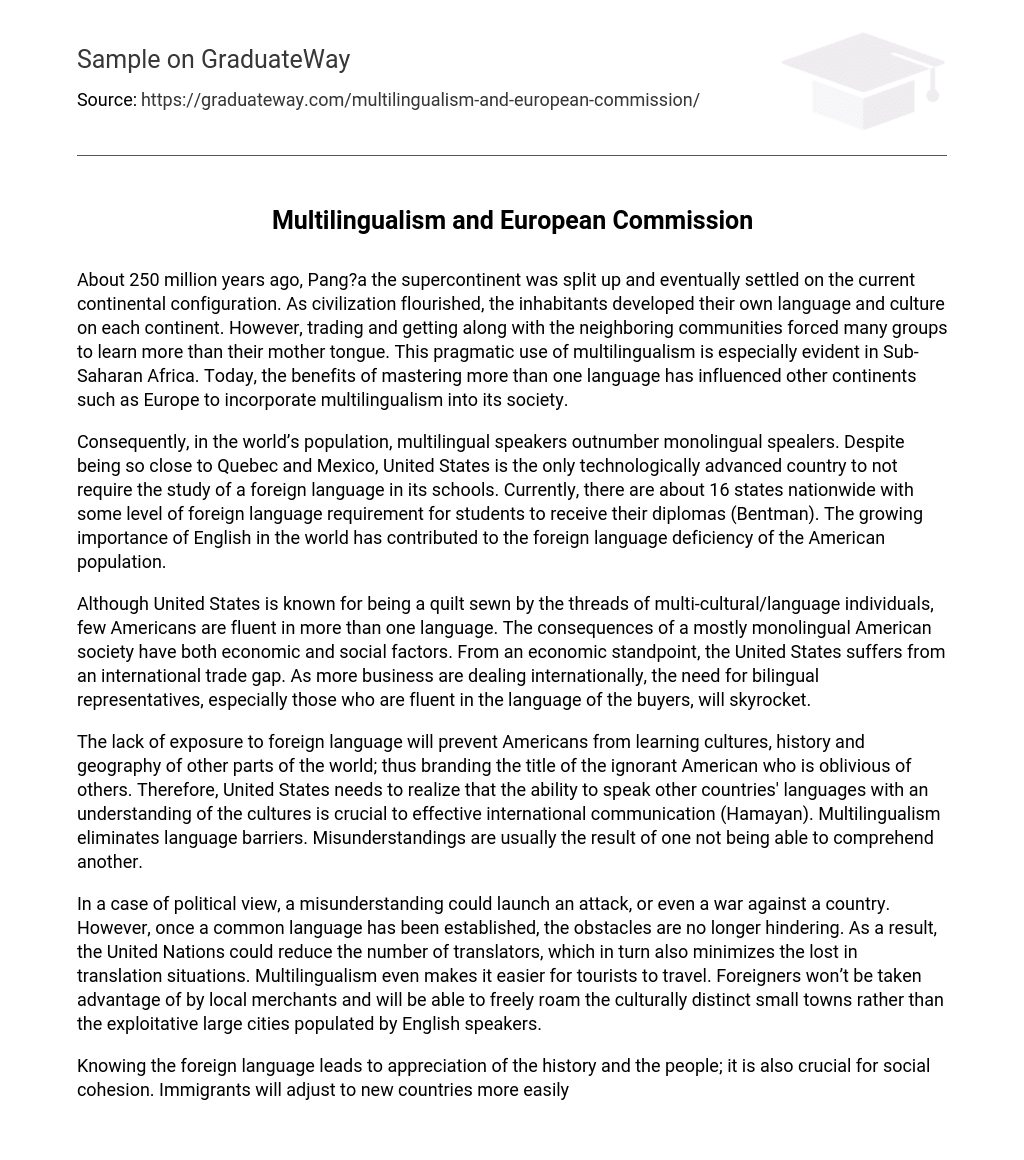About 250 million years ago, Pang?a the supercontinent was split up and eventually settled on the current continental configuration. As civilization flourished, the inhabitants developed their own language and culture on each continent. However, trading and getting along with the neighboring communities forced many groups to learn more than their mother tongue. This pragmatic use of multilingualism is especially evident in Sub-Saharan Africa. Today, the benefits of mastering more than one language has influenced other continents such as Europe to incorporate multilingualism into its society.
Consequently, in the world’s population, multilingual speakers outnumber monolingual spealers. Despite being so close to Quebec and Mexico, United States is the only technologically advanced country to not require the study of a foreign language in its schools. Currently, there are about 16 states nationwide with some level of foreign language requirement for students to receive their diplomas (Bentman). The growing importance of English in the world has contributed to the foreign language deficiency of the American population.
Although United States is known for being a quilt sewn by the threads of multi-cultural/language individuals, few Americans are fluent in more than one language. The consequences of a mostly monolingual American society have both economic and social factors. From an economic standpoint, the United States suffers from an international trade gap. As more business are dealing internationally, the need for bilingual representatives, especially those who are fluent in the language of the buyers, will skyrocket.
The lack of exposure to foreign language will prevent Americans from learning cultures, history and geography of other parts of the world; thus branding the title of the ignorant American who is oblivious of others. Therefore, United States needs to realize that the ability to speak other countries’ languages with an understanding of the cultures is crucial to effective international communication (Hamayan). Multilingualism eliminates language barriers. Misunderstandings are usually the result of one not being able to comprehend another.
In a case of political view, a misunderstanding could launch an attack, or even a war against a country. However, once a common language has been established, the obstacles are no longer hindering. As a result, the United Nations could reduce the number of translators, which in turn also minimizes the lost in translation situations. Multilingualism even makes it easier for tourists to travel. Foreigners won’t be taken advantage of by local merchants and will be able to freely roam the culturally distinct small towns rather than the exploitative large cities populated by English speakers.
Knowing the foreign language leads to appreciation of the history and the people; it is also crucial for social cohesion. Immigrants will adjust to new countries more easily and quickly. Thus they will play active roles and be productive residents in societies a lot sooner. To sum it up, multilingualism strengthens ties with other countries, improves social harmony, and integrates immigrants (European Commission). Multilingualism redefines business. Throughout the years, international business transactions and negotiations have been completed prominently within English speakers.
However, the booming markets in Asia have introduced a new target, customers who prefer to be addressed in their own language. The new frenzy of international business has attracted more people to become bilingual. Anyone who masters more than one foreign language skill has more advantage in terms of a better job through a wider range of job offers, and a competitive superiority that opens the door to fresh opportunities abroad. Consequently, multilingualism can unlock the full potential of the single market in terms of better jobs and prosperity (European Commission).
Given the appropriate environment, people tend to pick up a new language easily at a young age. Multilingualism doesn’t require complete fluency in another language, or the ability to speak two unrelated languages. The benefits of multilingualism are so stupendous that they extend outside the area of language. Children and elders learning a foreign language have been demonstrated to be consistently better able to deal with distractions, like holding two languages concurrently without allowing words and grammar slip from one to another (Bialystok).
Multilingual speakers also develop a greater vocabulary size over time (Kosmidis), a markedly better language proficiency in, sensitivity to, and understanding of their mother tongue (Johnson), and have a better ear for listening and sharper memories (Lapkin, Ratte). Furthermore, evidence has shown that skill in several languages fosters creativity and innovation: multilingual people are aware that problems can be tackled in different ways according to different linguistic and cultural backgrounds (European Commission). They can use this ability to find new solutions.
Ultimately, United States needs to acknowledge that the social, economic and physical benefits of multilingualism are astonishing. Foreign language at all levels of the school system is necessary for this nation’s future well being. On a global scale, multilingualism is an asset for the international community to tackle the linguistic diversity and to conduct business efficiently. On a personal scale, learning a second language enhances the use of the first one, introduces more values and beliefs, and provides a new outlook on life.





